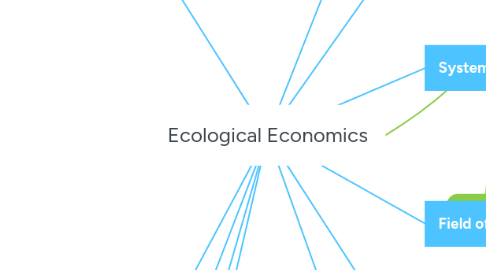
1. Science and etics
1.1. Neoclassical economics
1.1.1. Consumer sovereignty
1.1.1.1. Efficiency
1.2. Ecological economy
1.2.1. Individual and social health
1.2.1.1. Sustainability
2. Distributive ecological conflicts
2.1. Strong impact
2.1.1. Biosphere
2.2. Social struggle
2.3. Negative externality
2.3.1. Social costs
2.3.1.1. Poverty
2.3.1.2. Health
2.3.2. Private costs
2.4. Unequal ecological trade
2.5. Concepts
2.5.1. Environmental racism
2.5.1.1. Toxic waste
2.5.1.1.1. Territory
2.5.2. Environmental justice
2.5.2.1. Against
2.5.2.1.1. Environmental racism
2.5.3. Environmental blackmail
2.5.4. Toxic imperialism
2.5.5. Ecologically unequal exchange
2.5.6. Ecological debt
2.5.7. Transboundary pollution
2.5.8. Environmental space
2.5.9. Ecological footprint
2.5.10. Bio piracy
2.5.11. Indigenous environmentalism
2.5.12. Ecologism of the poor
2.5.13. Urban fights
2.5.13.1. Clean water
2.5.13.2. Green areas
2.5.14. Labor struggles
2.5.14.1. Health
2.5.14.2. Job security
3. System closed
3.1. Company
3.2. Market
3.3. Manufactures
3.4. Family
3.5. Production factors
4. Meaning
4.1. Ecology
4.1.1. Plants
4.1.2. Animals
4.2. Economy
4.2.1. Humans
4.2.1.1. Subsist
4.2.1.1.1. Satisfaction of needs
4.3. Connection
4.3.1. Government
4.3.1.1. House
4.3.1.1.1. Nature
4.3.1.1.2. Humans
4.4. Dynamic
4.4.1. Systemic
4.4.1.1. Evolutionary
5. Field of study
5.1. Transdisciplinary
5.1.1. Beyond
5.1.1.1. Economic growth
5.1.1.2. Sustainability of the environment
6. Open system
6.1. ENVIRONMENT
6.1.1. Solar energy.
6.1.2. Raw Materials.
6.1.2.1. Material waste.
6.1.2.1.1. Recycling.
6.1.3. Useful energy.
6.1.4. Flow
6.1.4.1. Material
6.1.4.2. Energy
7. Environmental problems
7.1. Growth of social metabolism
7.1.1. Expansion of economic frontiers
7.2. Accelerated growth
7.2.1. Population
7.2.2. Economic
7.3. Human needs
7.3.1. Over consumption
8. Political ecology
8.1. Study
8.1.1. Local and international
8.1.1.1. Distribution
8.1.1.1.1. Environmental costs
8.1.1.2. Appropriation
8.1.1.2.1. Natural resources
9. Greenhouse effect
9.1. Global issues
9.2. National policies
9.3. Reduction
9.3.1. Emissions of CO2

